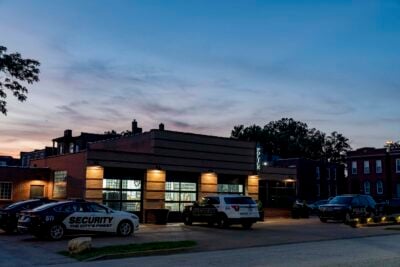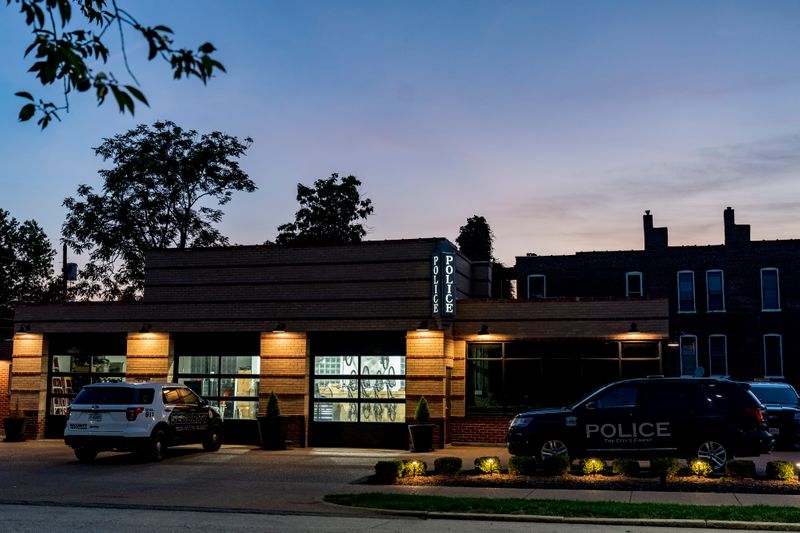
Series: Policing in St. Louis
Private Policing Firms Patrol Wealthy Neighborhoods
Three months after a St. Louis public safety official said the city planned to review how off-duty police officers are used by private companies to patrol some neighborhoods, city officials said they had identified a consultant to do the work but were still looking for a way to pay for it.
The pledge to review police moonlighting came in September, after ProPublica revealed how the use of private police forces in St. Louis exacerbates disparities in how the city is protected. Deputy Public Safety Director Heather Taylor, responding to ProPublica’s findings, said the city would hire a consultant to study the issue.
Mayor Tishaura O. Jones said more recently that she intends to make changes to the private policing system to eliminate the disparities. “The well-heeled few, or those who pay extra taxes, shouldn’t get extra protection,” Jones said in a St. Louis Public Radio interview this month. “We all pay taxes in order to make sure that we get equal protection from our police department.”
The police department could be set for an overhaul with Jones’ appointment last week of its first chief from outside the agency in its 214-year history. Robert Tracy, the chief in Wilmington, Delaware, will start Jan. 9.
Tracy could not be reached; Jones and Taylor did not respond to requests for comment. But Monte Chambers, a program manager for the Public Safety Department, said the city planned to hire a consultant who is already working on another project for the city to review other policing issues, including the city’s private policing system.
The review would begin “once I have found a funding source,” Chambers said in an email last week.
Chambers did not respond to additional questions seeking details about the review.
While the publicly funded St. Louis Metropolitan Police Department struggles to deploy officers in visible roles across the city, ProPublica found that about 200 of them work part time for the city’s biggest private policing firm in some of the wealthier and predominantly white neighborhoods.
Unlike in other places where officers moonlight in security roles, St. Louis officers wear their city police uniforms and can investigate crimes, stop pedestrians or vehicles, and make arrests while working for private policing companies.
The investigation found that city employees working as private police officers were sometimes offered monetary rewards for working on specific cases and that St. Louis’ largest policing firm, The City’s Finest, employs many of the department’s highest ranking officers, including four of the six district commanders.
Some of those commanders sometimes work on trivial matters for their private clients while the police department struggles to deploy officers to parts of the city grappling with violent crime.
Jones, elected in 2021, has criticized policing in St. Louis as “inefficient and ineffective” and, in the radio interview, lamented that private policing makes the city stand out for its disparities. She has talked about restructuring the department and shifting funding to programs that try to prevent crime, such as mental health services and job training initiatives.
Megan Green, who in November was elected president of the city’s Board of Aldermen and is the city’s second-highest ranking official, said private policing was an issue that the new chief “needs to take up pretty quickly.” She also said the Board of Aldermen should examine the source of funding for private policing: the neighborhood taxing districts that raise millions of dollars a year.
Many affluent city neighborhoods have created taxing districts, the latest formed this summer in south-side Holly Hills. The districts are authorized by state law, but they periodically need to be renewed by property owners and the city. Green said the board could try to determine if “there are some taxing districts that need to be dissolved.”
“I think that the special taxing districts definitely create inequities in our city,” Green said. She said the city should “be more strategic about where special taxing districts are created. We historically have not had a lot of strategies around that as a city, which I think has created even greater inequities.”
The Board of Aldermen’s Public Safety Committee had planned to talk about private policing during a meeting last week, but officials from the city’s Public Safety Department did not show up and the discussion wasn’t held.
Eliminating private policing could potentially roil the city. Luke Reynolds, chair of a taxing district in the city’s Soulard neighborhood that raises about $300,000 a year for private policing, said that if city police officers were barred from working for the private company that patrols his area, the neighborhood would look at other ways to enhance public safety. “I have no idea what that would look like,” he said.
“I have said all along that I don’t necessarily think the system is really necessarily fair. But then again, there is a lot of inequity in the world, unfortunately,” said Reynolds, who owns a bar in Soulard. “We’re going to try to make our neighborhood as safe as we can within the system that exists.”
Don Bellon, who owns a wrecking and salvage business and serves on a board that hires private police in the Grove entertainment district near the city’s central corridor, said paying for policing was necessary “because the city can’t provide it.”
But he said he was frustrated with a lack of accountability for private officers. At a recent Grove board meeting, he questioned what the private officers were doing on a night when several crimes were committed.
“There’s really no oversight on them,” he said. “They’re freelancing. They just decide where to go.”
Charles “Rob” Betts, who owns The City’s Finest, did not respond to a request for comment. Betts has called his company “essentially an extension of the police department” for neighborhoods who want to hire more police. And he has defended giving officers rewards for working on specific cases as not unlike an officer being recognized for good police work at a luncheon.
In reporting on policing in St. Louis this year, ProPublica showed that police and neighborhood advocates have sought court orders to banish individuals from large sections of the city and officers have enforced those mandates through arrests — a practice legal experts said few cities have taken to such extremes. Representatives for the mayor did not respond to requests for comment.
In a partnership with APM Reports this year, ProPublica also found St. Louis had massaged its murder totals in a way that may have violated FBI crime reporting guidelines and created false optimism about police performance. The city quietly lowered its murder counts for 2020 and 2021 by classifying more than three dozen killings as justifiable homicides — deaths not included in the city’s murder count. Neither the department nor representatives for Jones responded to requests for comment for the story.





